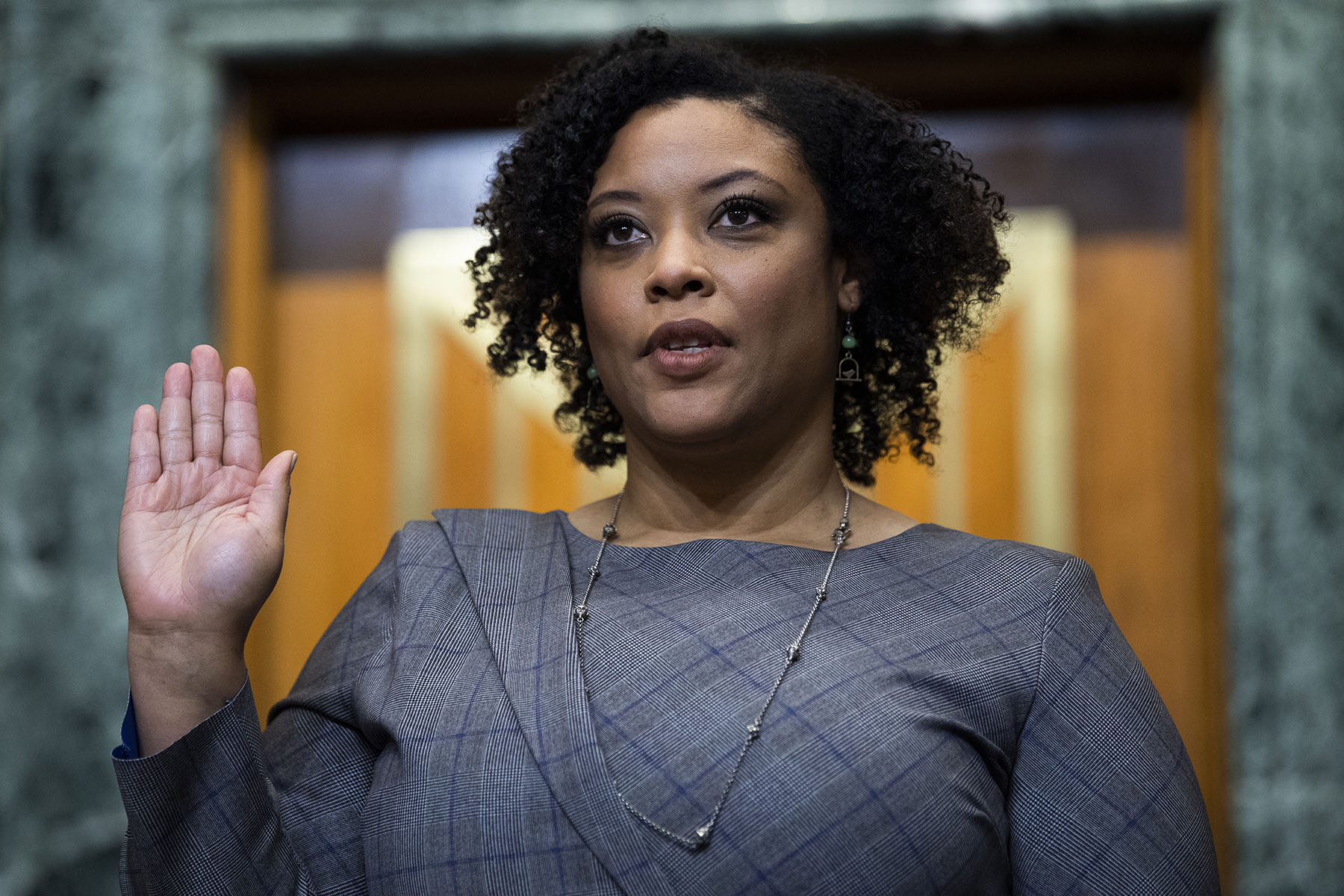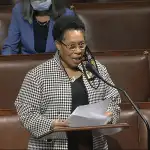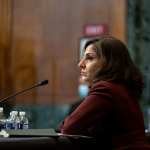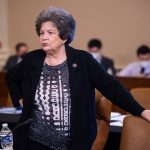After a 15-year career as a staffer on the Appropriations Committee in the House of Representatives, Shalanda Young became President Joe Biden’s director of the Office of Management and Budget, the first Black woman to serve in this role. She formally took office in March 2022, after serving on an interim basis for a year. Young spoke to The 19th at the end of her historic tenure about her accomplishments, how she brought her lived experience to her leadership, and her departing concerns.
This interview has been edited for length and clarity.
Errin Haines: As your pioneering term comes to an end, what are you most proud of accomplishing as director of the Office of Management and Budget?
Shalanda Young: First of all, Errin, I will still not get comfortable with words like “pioneering” and “historic” A lot of my career ended up with me being in the right place at the right time, and a lot of hard work and finding the niche where I felt like I contributed to this country. I found the Appropriations Committee and realized the impact budgets have on people’s lives. You know, it just heartens my soul to think some family got a Head Start slot. They’ve been on the list all year, and then Mom can go get a part-time job, contribute to the family, pay down a bill, or to hopefully start a college fund, get the bills under control. They will never know me, I will never meet them, but that is okay. So whatever contributions I was able to make by fighting back efforts to cut women and children’s nutrition programs, making sure we paid our Head Start teachers more, but also making sure we had enough slots for kids and families being involved from my time on the Appropriations Committee to here and doubling the child care Block Grant.
Also, you know, OMB is one of those places I get to do domestic and international. Being able to secure Ukraine funding, to me, that’s no less than defending democracy. I’d been to Ukraine three times before Russia’s latest incursion, and I met kids there in child care centers like here. You see people and you realize people aren’t different. Doesn’t matter the country or the language, something doesn’t sit right with your soul if you don’t do something to help defend the country and their children from hostilities.
And looking at what we do from a budget standpoint, through that value lens, I mean, I don’t think I stray too far from how I was raised in this job.
I want to ask you about your approach to this role because one of the things I remember you talking about in your nomination hearing is this idea that a budget is a reflection of your values. And even just listening to you right now, a budget being a reflection of a healthy democracy is really what it sounds like your approach is, in part, and that a federal budget can and should help to make the promise of America real for families and communities. Can you just talk a little bit more about that philosophy and how you brought that philosophy to this role?
We all come from different points of view. I come from a little small town in Louisiana. I know the rural experience when you talk about communities left behind, where we’re losing our young people like myself. We should have some minimums in this country, I think, about education. Communities who may not have a tax base — meaning people who may not have the best-paying jobs — their schools are going to suffer because of their tax base. The federal government should be that backstop so that every kid gets a basic education that can set them on their way to sit in chairs like this.
It still amazes me that I’m the first Black woman to sit in this chair and do budgets. I don’t want to be the last. And I think about these investments in education that ensure I won’t be the last. I’m a product of public education. I’m a product of magnet schools, people thinking outside of the box of how we bring kids together from across communities — that’s what magnet schools do. So all of those decision points by people like me determine what little girls a generation later do and what seats they get to sit in.
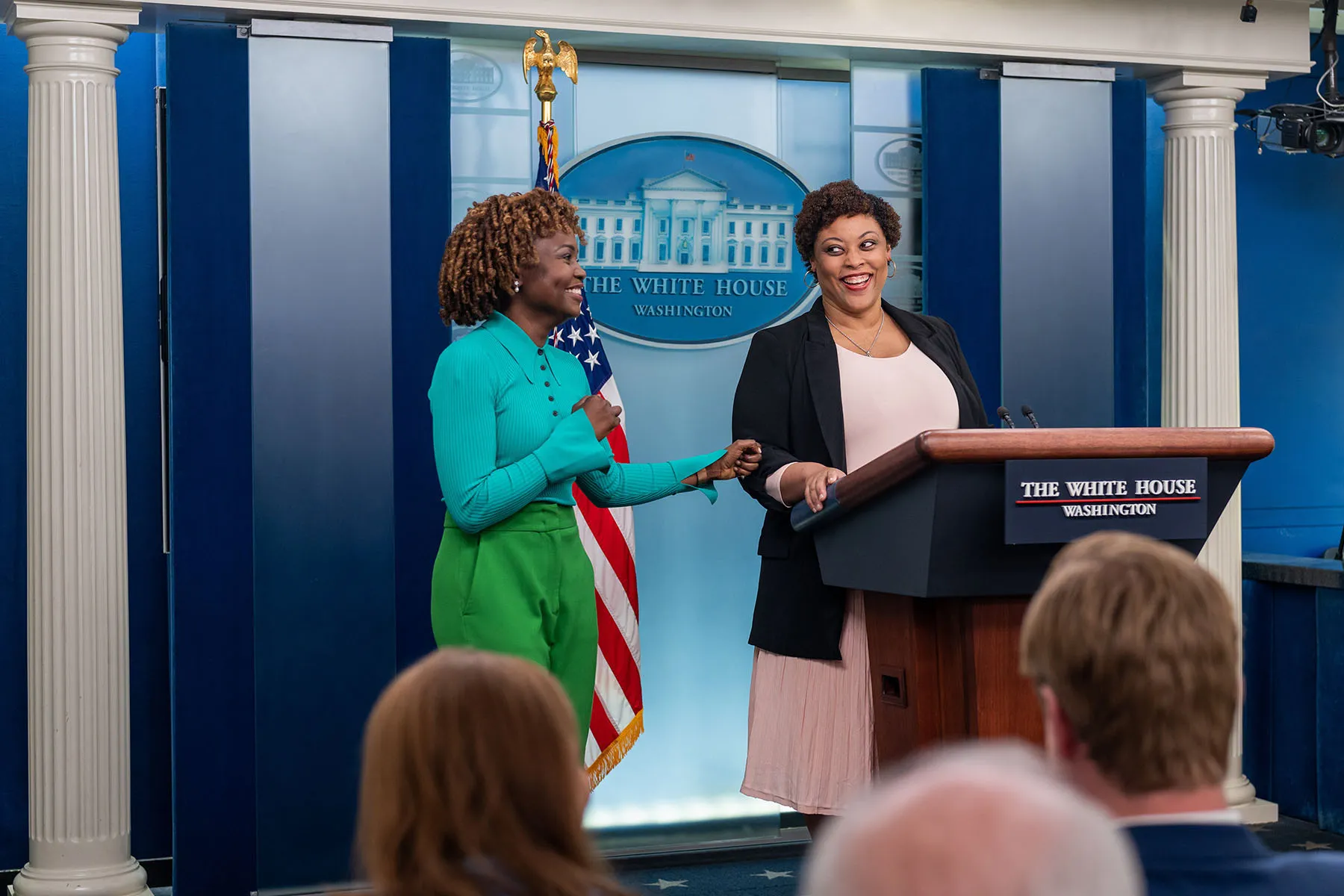
Can you elaborate on how your lived experiences factored into how you did this work, how you were thinking about people like you, people who grew up the way that you grew up and what their needs are?
I think most Americans are like me. I choose to believe that the boy from Scranton, Pennsylvania, with his budget director from Clinton, Louisiana, those towns probably have more in common than not, except for the weather.
I’ve also tried to make a career out of finding commonalities amongst people; no matter race, no matter gender, no matter where you grew up, there are basic things people want for their kids and their families. I can take my ball and go home if I want perfection. I have chosen a career where I have had to work across the aisle and I have found more similarities than not with people once you got to know them — and we need a little more of that in this town where people have a little dinner diplomacy because you can’t work with people you don’t know.
It’s easy to stand behind the talking points. If you know somebody, you have to give them a chance to make their case. And I’ve enjoyed doing that work, and I’ve enjoyed it’s ugly, it’s rough. You don’t have to compromise your values. But I’m a big believer in taking incremental wins when you get them.
That is, frankly, something that is rare in Washington, right? And yet you have earned this reputation as a “Republican whisperer.” How is that possible in our seemingly deeply divided right-partisan political climate?
Well, one, I’m from the rural South. My grandmother, who just passed away, always had friends of different races in our town. It was built into me, the idea that our differences are fewer than what connects us, and trying to look for a human element. If someone tells me I’m a horrible human being all the time, not going to really listen to what they have to say. I try to show respect for people who might have different ideas about how to advance this country. If you ask, ‘What is the ultimate goal for families in this country?’ Democrats and Republicans tend to say the same thing. They want families to have a better economic outlook, to have their kids do better than the next generation. That is always how we judge our society, and it’s worked for us. There are big disagreements in that, but there is something about keeping the thread about the end goal, reminding ourselves that we all want the best for Americans.
Can you think of an example during your tenure of how you responded when partisan politics might have been getting in the way when you did have to?
We were at risk of breaching the debt ceiling, which every economist told us could mean 8 million Americans jobs with the global economy quickly tumbling after, so the stakes could not have been higher. But the idea of people asking for cuts to programs like biomedical research … people like to say “non-defense discretionary.” Well, if you just say that to Americans, they’re like, “Okay, you can probably cut some of that.”
And then you remind them, that’s Head Start. That’s the National Institutes of Health. That’s the Center for Disease Control. People usually say we should be doing that. As a matter of fact, we should be doing more things, like food inspections. We should have more of that, not less. That’s a hard pill to swallow, to think about negotiating with someone to just do their basic job of lifting the debt ceiling and making sure Americans don’t suffer insisting on cuts that would also hurt Americans. That was a hard thing to wrap one’s brain around. And for the longest, you know, we said we would not negotiate in that way. It’s Congress’ job to lift the debt ceiling, but when one side is intransigent and just refuses to do it, what’s best for the country? Sit down and talk.
I will still say the Congress should have done it without conditions. It was divided government. The realities were, we had to sit down and find a solution, and I think we came to a fair solution and averted a crisis.
You are someone the American people did get to see, maybe more than they have traditionally seen someone who was the head of the Office of Management and Budget. Was being somewhat public-facing, trying to explain to people the consequences of budget decisions, something that was important to you in this role?
I think an essential part of my job is explaining what we’re doing. I think the president would say that the highest compliment he’s ever given me is, ‘You speak like regular people.’ If we’re doing stuff and we cannot communicate that to people, we’re not doing our full job.
When you lay down the facts of what something is, these very government-heavy acronyms and ways we talk about federal budgets can sound extremely complicated. Most Americans are familiar with programs that have helped their families or they know a cousin who needed this or that. When you speak to it in words people can relate to, you draw them into the conversation. And an American people, an electorate, who are more involved in the conversation, I think, leads to better policy outcomes, because people aren’t going to stand for it if they really understand what is happening in the halls of Congress and what’s happening in a White House.
And frankly, in a divided government, the only things that were getting passed were funding bills. So it’s not just important values-wise — it’s the only piece of legislation moving and when you think about that, it’s the one place we can still make a huge impact in this country.
You’ve had a lot of priorities to juggle during your tenure, from disaster relief for hurricanes and wildfires, the COVID-19 response, you mentioned the debt ceiling and Ukraine funding. What would you say were probably among the more challenging issues that you had to try to navigate during your tenure?
If it’s worth doing, it’s hard, right? You can’t be afraid to go into complicated things and find a solution. Lots of people in this town have an opinion and you should hear all viewpoints. But at the end of the day, the key is action. Don’t get so stuck that you forget that people are waiting for assistance. You’ve got to keep the process moving forward to actually get something done and we also have to work with Congress to get something done. I’ve seen so many ideas meant to help people that don’t make it because both sides of Pennsylvania [Avenue] either don’t talk or talk past each other.
We are in a moment of transition where so many things are political, including this office. I wonder how you’re thinking about the potential for the politicization or even the weaponization of the Office of Management and Budget and if you are concerned that that is where things could be headed.
One: Politics isn’t a bad word. I hope good people continue to run for office. I’ve always been on the policy side, but I’ve worked with elected officials and I hope people don’t get so down on the process that good people choose to sit out. It’s okay to have a political process in this country we always have, and good and decent people need to keep running for office, and people like me will help them implement policy when they get into office.
But there is a difference between a political process and one that seeks to break everything down that this country has historically stood for, norms that would be thrown out that developed over time because we did see overreach. You know, one extremely boring budget law that came around in the 1970s is a great example, the Empowerment and Control Act that came out of Nixon’s overreach. I’ve heard lots of things that concern me about efforts to weaken that law or ignore that law. The majority, I believe, of policymakers in this town know right from wrong, and that they will come together and push back on the most extreme. There comes a tipping point where people will no longer stand by.
President-elect Trump has nominated Russell Vought to lead the OMB after you are gone, somebody who has helped to shape Project 2025 in his role at the Heritage Foundation, and he does have a vision that sounds like it’s a clear departure from everything that we are talking about and what you have tried to accomplish here. What thoughts do you have about what his plans might be for the office and how that could impact your legacy?
Elections have consequences. Like all of us, you know, he’s being brought on to do what his elected president asked him to do. The problem and concerns I talked about earlier are when laws aren’t being followed, when norms are turned on their heads, when America walks away from 50 years of precedent and policy on the national security front. What does that say if you’re an ally of this country, when you can’t count on America to speak with one foreign policy voice?
I suspect this OMB is going to look very different than our OMB as far as policy and that was hashed out in November, that is what it is, and that is what elections and politics are for to determine. But we all have to keep our eye out and make sure that people are following the law and not doing things that just change the fabric of our country.
What is next for you? Is there anything you’re leaving undone that you wish that you had time to get to?
If you are not leaving in your mind, like, so disappointed about the stuff you didn’t get to, then your vision wasn’t big enough. Sometimes I rack my brain for successes because they always lead me back to, ‘If I had more time, I would have done this, this and this,’ and that’s speaking with someone who has 23 years of government service. And so some of these things, you know, you do run out, run out of field, and you just aren’t able to finish some of the stuff that you would have loved to have done.
What I’ll do next is sleep, spend more time with the 3-year-old without two phones on my ear. I’d like to reset, recharge and think about what voice I have that will help this country and contribute to the conversations that we should all be having.
